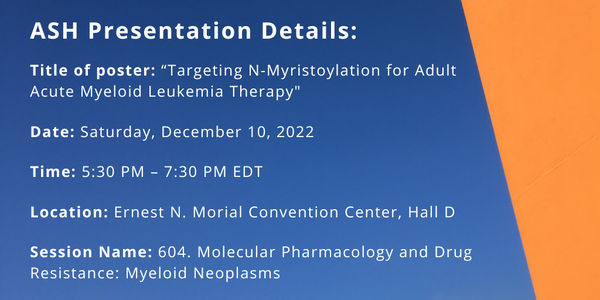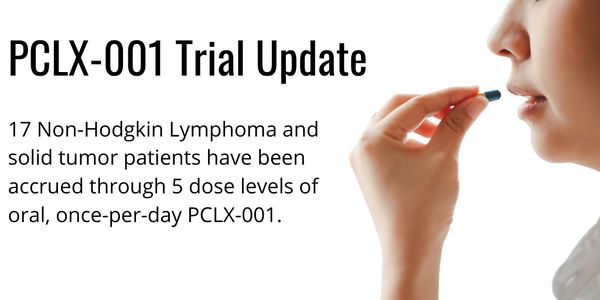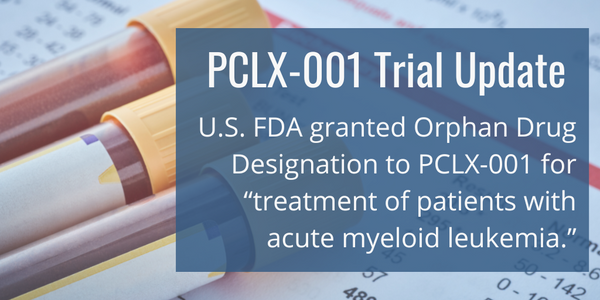Edmonton, Alberta, Canada, November 3, 2022- Pacylex today announced that data from the ongoing Phase 1 dose escalation clinical trial of PCLX-001, an N-myristoyltransferase (NMT) inhibitor, as well as the scientific rationale for its use in acute myeloid leukemia (AML) patients, will be presented at the American Society of Hematology (ASH) Annual Meeting and Exposition from 10-13 December 2022. The ongoing study is in Non-Hodgkin’s Lymphoma and solid tumor patients and the company will present the non-clinical evidence that AML patients may benefit as well.
ASH Presentation Details:
Title of poster: “Targeting N-Myristoylation for Adult Acute Myeloid Leukemia Therapy"
Date: Saturday, December 10, 2022
Time: 5:30 PM – 7:30 PM EDT
Location: Ernest N. Morial Convention Center, Hall D
Session Name: 604. Molecular Pharmacology and Drug Resistance: Myeloid Neoplasms
In addition to the presentation, the abstract will be published online in the November supplemental issue of Blood.
Seventeen Non-Hodgkin Lymphoma and solid tumor patients have been accrued through 5 dose levels of oral, once-per-day, PCLX-001. No dose limiting toxicities have been identified. Pharmacokinetic analysis shows rapid oral absorption, an elimination half-life of ~ 10 hours, no plasma accumulation, and drug exposure increasing linearly with dose. The PK is consistent with once-per-day oral administration. Last month the U.S. FDA granted Orphan Drug Designation to PCLX-001 for “treatment of patients with acute myeloid leukemia.” This month Pacylex received clearance from the U.S. Food and Drug Administration (FDA) of an Investigational New Drug (IND) application for PCLX-001 for the treatment of AML.
“We are very pleased by the clinical progress which has demonstrated that an NMT inhibitor can be dosed safely to levels proportional to those that achieved efficacy in vitro and in animal cancer models,” said John Mackey, CMO of Pacylex.
The poster will also present results from in vitro and in vivo studies that indicate PCLX-001 is at least as effective against AML cancer cells, including leukemic stem cells (LSCs), the sub-population believed to be responsible for AML recurrence, as it is against lymphoma cells. “In two different patient derived xenograft models, the LSC subpopulation were even more sensitive to PCLX-001 than AML circulating blast cells, which were still very sensitive,” said Luc Berthiaume, CSO of Pacylex. “This provides further support for our plans to initiate a clinical in AML patients in the coming months.”
The ongoing clinical PCLX-001 trial in NHL and solid tumor patients is registered at ClinicalTrials.gov Identifier: NCT04836195.
PCLX-001 (aka DDD86481) is a first-in-class, small molecule NMT inhibitor originally developed by the University of Dundee Drug Discovery Unit as part of a program to treat African sleeping sickness, funded by Welcome Trust. Pacylex is developing PCLX-001 in the form of a once-a-day pill initially to treat leukemia and lymphoma. PCLX-001 has also been shown to inhibit the growth of lung and breast cancer tumors in animal models. In leukemia, lymphoma and breast cancer patients, the levels of NMT2 is correlated with survival, suggesting an important biological role in these cancers.
Pacylex is a pharmaceutical company headquartered in Edmonton, Alberta, Canada, targeting hematologic and solid cancers with a new first-in-class therapeutic, PCLX-001. Pacylex’s technology combines new insights from Dr. Luc Berthiaume of the University of Alberta connecting myristoylation to cancer with a family of high quality myristoylation inhibitors Pacylex licensed from the University of Dundee. PCLX-001 is the lead drug in a new class of NMT inhibitors, enabling Pacylex to exploit NMTs as new clinical targets for cancer treatment. Pacylex initiated clinical studies in Canada in the fall of 2021 in non-Hodgkin lymphoma and solid tumors and will soon initiate clinical studies in the US in acute myeloid leukemia patients. Pacylex is also receiving support from an Alberta Innovates AICE grant in 2020, and the research leading to this breakthrough was supported in part by the Alberta Cancer Foundation and the Cure Cancer Foundation. The US Department of Defense is supporting the initial clinical investigation of PCLX-001 in AML patients.







